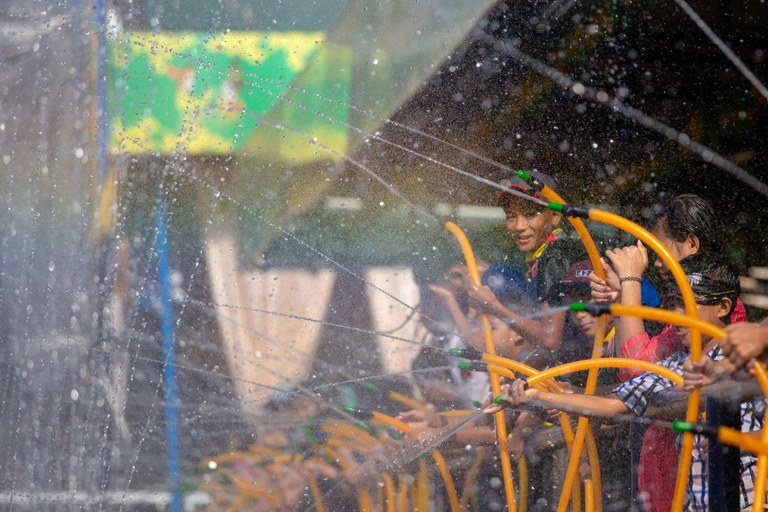Former Myanmar army officer calls Rohingya crackdown ‘genocide,’ offers to testify
Captain Nay Myo Thet served in Myanmar’s military for nearly six years in Rakhine state but defected in December and relocated to an area under the control of anti-junta Civil Disobedience Movement (CDM) forces. In 2016, a military crackdown forced some 90,000 Rohingya to flee Rakhine state and cross into neighboring Bangladesh, while a larger one in 2017 in response to insurgent attacks, killed thousands of members of the ethnic minority and led to an exodus of around 700,000 across the border. The former transportation officer told RFA’s Myanmar Service in an interview that the military’s clearance operations amounted to “a genocide” and said he is willing testify as a prosecution witness in a case that was brought against the military to the International Court of Justice (ICJ) at The Hague. RFA: Can you first tell us about your background? Nay Myo Thet: I first attended the Pyin-Oo-Lwin Defense Services Academy in 2006. I finished training in 2008 and served with units in the Division 5 and Division 6 areas in Kayin and Kachin states, as well as northern Shan state. I was sent to Rakhine state in 2015 to serve with the No. 233 Infantry Battalion in Buthidaung and was stationed there until I joined the CDM in November 2021. RFA: Can you tell us more about the operations that drove the Rohingya people out of Rakhine State? Nay Myo Thet: I was a captain in the Supply and Transport Battalion in 2015, serving with the No. 1 Border Police Force Strategic Command. A clearance operation was launched for the first time in 2016 following a terror attack in Kyi-Gan-Byin and another one in 2017 after the [Arakan Rohingya Salvation Army (ARSA) insurgent] raid on three Border Police posts in the same area. When we went there the second time, we noticed there was nothing much left behind. The locals had taken away almost everything. RFA: Did the troops really commit the atrocities against the Rohingya people as accused by international rights groups? What’s your take? Nay Myo Thet: I can tell you only some things I’d learned about the units I served with. There was one officer who wanted to make a search for deadly weapons, like knives, and he asked the girls in the village to go into one room, lined them up and stripped them naked. And then, I heard from one soldier who was talking about his colleague who had raped a Rohingya woman. I cannot remember his name. Another incident I remember was about a young boy being thrown into a well. These incidents happened while I was serving with the No. 233 Infantry. And then, there were incidents that were spread by word of mouth about some soldiers committing brutal acts. Villagers were driven out of their houses and those who ran away were shot to death. Most of the bodies were buried in the fields beside the villages. As you may have seen in the photos, people left their villages in hordes – some carrying elderly people who could not walk in makeshift stretchers. Many who couldn’t cross the border were forced to live in the jungle and mountains. ‘This amounted to a genocide’ All these things should not have happened. Everything that happened was unacceptable. I tried to sound out my colleagues. Most of them had the idea that these people must be driven out – that they could not stay – because the [insurgents] who raided and attacked the police posts were of their same ethnicity. These villagers were giving support to the [insurgents] and they believed there would be no peace unless they were got rid of. These were their views. So, this wasn’t even like an ordinary military operation which would never be so brutal. They just wanted to get rid of the entire community without bothering to find out who [the insurgents that attacked the police posts] were. I agree with the international charges that all of this amounted to a genocide. RFA: What do you think of [deposed National League for Democracy (NLD) leader] Aung San Suu Kyi going to The Hague [in 2019] to defend the military against the charges made in the case brought by The Gambia? Nay Myo Thet: It seems like the military was waiting for a scapegoat, waiting for the NLD to come into power, to defend them because they could have done this [themselves] a long time ago and they didn’t … I think she went there with two goals – to defend the country’s integrity with a nationalist spirit as well as to defend the military. She seemed to feel responsible for the military. But I think it was wrong for her to do that. She shouldn’t have gone there. She wasn’t responsible at all for what happened and she didn’t commit the crimes. The military was responsible [for the crimes] … for creating the division between the [ethnic] Rakhines and the Rohingyas. Even for sowing hatred between the Rakhines and the [majority ethnic] Bamar. If I were to be summoned [to the ICJ], I’d surely go and disclose all I know. Translated by Khin Maung Nyane.



